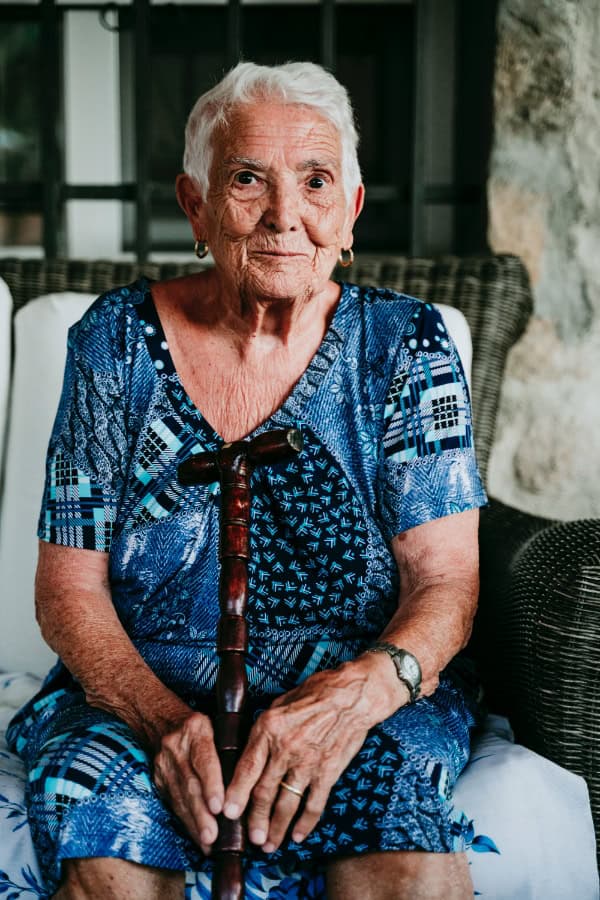Palliative Care for Dementia
Care Services
Watching a loved one journey through dementia is one of life's most heartbreaking experiences. As the person you've known and…















Watching a loved one journey through dementia is one of life’s most heartbreaking experiences. As the person you’ve known and cherished gradually changes, you may find yourself grappling with questions you never imagined asking: How do we ensure their comfort? When is the right time to consider palliative care? How do we honor their dignity while managing the complex challenges that advanced dementia brings?
If you’re caring for a parent, spouse, or other family member with dementia, please know that you’re not alone in this journey. Dementia affects millions of families across the United States, and while each person’s experience is unique, the love, dedication, and difficult decisions you’re facing are shared by countless others who have walked this path.
At Serenity Palliative & Hospice Care, we understand that dementia care requires a special kind of compassion – one that honors the person your loved one has always been while addressing the complex needs that arise as the disease progresses. This guide will help you understand how palliative care can provide comfort, dignity, and support for both your loved one and your entire family during this challenging time.
Understanding Dementia as a Terminal Condition
One of the most difficult aspects of dementia care is accepting that this disease, while often progressing slowly, is ultimately terminal. Unlike other conditions where the progression is more predictable, dementia follows a unique trajectory that can make it challenging to know when to transition from curative to comfort-focused care.
The Progressive Nature of Dementia: Dementia is not a single disease but rather a group of conditions that gradually impair cognitive function, memory, and the ability to perform daily activities. Alzheimer’s disease is the most common form, but vascular dementia, Lewy body dementia, and frontotemporal dementia all follow similar patterns of decline. In advanced stages, dementia affects not just memory and thinking, but also the body’s ability to function properly.
Recognizing Advanced Dementia: Advanced dementia is characterized by severe cognitive decline, loss of ability to communicate meaningfully, inability to recognize family members, incontinence, difficulty swallowing, and increased vulnerability to infections. At this stage, the focus of care naturally shifts from trying to slow the disease’s progression to ensuring comfort and quality of life.
Life Expectancy Considerations: While it’s impossible to predict exactly how long someone will live with advanced dementia, studies suggest that people in the final stages typically have a life expectancy of six months to two years. However, some individuals may live longer, and the progression can be unpredictable. What matters most is ensuring that your loved one receives appropriate care that focuses on comfort and dignity rather than aggressive medical interventions that may cause distress.
The Importance of Early Planning: Understanding dementia as a terminal condition doesn’t mean giving up hope or abandoning care. Instead, it allows families to make informed decisions about the type of care that will best serve their loved one’s needs and wishes. Early conversations about preferences for care, while your loved one can still participate in decision-making, are invaluable.
Unique Challenges in Dementia Care
Caring for someone with dementia presents challenges that are distinctly different from other serious illnesses. These challenges affect not only the person with dementia but also their family members and caregivers, creating a complex web of needs that require specialized understanding and support.
Communication Barriers: As dementia progresses, your loved one may lose the ability to express their needs, pain, or discomfort verbally. This can make it incredibly difficult to know when they’re experiencing physical pain, emotional distress, or simply need comfort. Families often feel helpless when they can’t understand what their loved one is trying to communicate or when communication seems to disappear entirely.
Behavioral Changes: Dementia can cause dramatic personality changes, agitation, aggression, wandering, or repetitive behaviors that can be distressing for both the person with dementia and their family members. These behaviors are symptoms of the disease, not character flaws, but they can be exhausting to manage and emotionally painful to witness.
Unpredictable Progression: Unlike some terminal illnesses that follow a more predictable course, dementia can have periods of stability followed by rapid decline, or gradual changes that occur over many years. This unpredictability makes it difficult to plan for care needs and can leave families feeling uncertain about what to expect.
Physical Complications: Advanced dementia often brings complications such as difficulty swallowing, increased risk of pneumonia, urinary tract infections, and skin breakdown. These medical issues require careful management to prevent unnecessary suffering while maintaining comfort.
Caregiver Burden: The demands of dementia care can be overwhelming for family members, who often serve as primary caregivers for years. The emotional toll of watching a loved one’s decline, combined with the physical demands of caregiving, can lead to caregiver burnout, depression, and health problems.
Palliative Care Goals for Dementia Patients
Palliative care for dementia focuses on enhancing quality of life and providing comfort rather than pursuing aggressive treatments that may cause distress without meaningful benefit. Understanding these goals can help families make decisions that honor their loved one’s dignity and well-being.
Maximizing Comfort: The primary goal is ensuring that your loved one is as comfortable as possible. This means managing pain effectively, addressing physical symptoms that cause distress, and creating an environment that promotes peace and security. Comfort care recognizes that your loved one’s experience of the world may be different now, but their need for comfort and dignity remains paramount.
Preserving Dignity: Maintaining your loved one’s dignity involves respecting their personhood even as their cognitive abilities decline. This includes providing personal care with gentleness and respect, maintaining their appearance when possible, and treating them with the same love and consideration they’ve always deserved.
Supporting Meaningful Connections: While your loved one may not be able to engage in conversations as they once did, they can still benefit from loving presence, gentle touch, familiar music, or other sensory experiences that provide comfort and connection. Palliative care recognizes that relationship and connection remain important even in advanced dementia.
Reducing Unnecessary Interventions: Palliative care for dementia often involves thoughtful decisions about which medical interventions are truly beneficial and which may cause more distress than benefit. This doesn’t mean abandoning medical care, but rather choosing treatments that align with comfort-focused goals.
Family Support: Caring for the whole family is an essential component of palliative care for dementia. This includes providing emotional support, education about what to expect, and practical assistance with caregiving challenges.
Managing Physical Symptoms in Advanced Dementia
Physical symptom management in advanced dementia requires a delicate balance between providing relief and avoiding interventions that might cause additional distress. Understanding common symptoms and how they can be managed helps families advocate for their loved one’s comfort.
Pain Management: People with dementia can experience pain from arthritis, pressure sores, infections, or other conditions, but they may not be able to communicate their discomfort clearly. Caregivers must learn to recognize signs of pain, such as grimacing, restlessness, changes in breathing, or increased agitation. Effective pain management might include medications, positioning, massage, or other comfort measures.
Eating and Swallowing Difficulties: As dementia progresses, swallowing becomes increasingly difficult and dangerous. Rather than forcing food or considering invasive feeding procedures, palliative care focuses on offering favorite foods in manageable forms, ensuring proper positioning during meals, and providing mouth care for comfort. The goal is to maintain dignity around eating while preventing aspiration pneumonia.
Breathing Issues: Respiratory problems are common in advanced dementia, whether due to pneumonia, aspiration, or other complications. Comfort-focused care might include medications to ease breathing, positioning to improve comfort, and oxygen therapy if it provides relief without causing distress.
Skin Care: Maintaining skin integrity becomes increasingly important as mobility decreases. This includes regular repositioning, proper hygiene, moisturizing, and protecting pressure points. Good skin care not only prevents discomfort but also maintains dignity and prevents infections.
Medication Management: The medication regimen for someone with advanced dementia should be regularly reviewed to ensure that each medication serves a comfort-focused purpose. Medications that no longer provide benefit or that cause side effects should be discontinued, while those that improve comfort and quality of life should be continued.
Emotional and Behavioral Support Strategies
The emotional and behavioral symptoms of dementia can be among the most challenging aspects of the disease for both patients and families. Understanding these symptoms as expressions of unmet needs rather than deliberate actions can help guide more compassionate and effective responses.
Understanding Behavioral Communication: When someone with dementia exhibits challenging behaviors, they’re often trying to communicate something important – pain, fear, confusion, or a basic need. Learning to interpret these behaviors as communication can help caregivers respond more effectively and compassionately.
Creating Calming Environments: The physical environment can significantly impact emotional well-being for people with dementia. This includes reducing noise and confusion, maintaining familiar objects and photographs, ensuring good lighting, and creating spaces that feel safe and comfortable. Simple environmental modifications can reduce agitation and promote peace.
Validation and Emotional Support: Rather than trying to correct or reorient someone with dementia to reality, validation therapy acknowledges their emotional experience and provides comfort. If your loved one is worried about a deceased parent, for example, acknowledging their concern and providing reassurance can be more helpful than reminding them of the reality.
Maintaining Routine and Familiarity: Consistent routines and familiar activities can provide comfort and reduce anxiety for people with dementia. This might include regular meal times, consistent caregivers, familiar music, or simple activities that your loved one has always enjoyed.
Managing Sundowning: Many people with dementia experience increased confusion and agitation in the late afternoon and evening, known as sundowning. Strategies to manage this include maintaining good lighting, reducing stimulation during these times, and ensuring adequate rest during the day.
Communication Approaches for Dementia Patients
Effective communication with someone who has dementia requires patience, creativity, and a willingness to adapt your approach as the disease progresses. While verbal communication may become increasingly difficult, meaningful connection can still occur through various methods.
Verbal Communication Strategies: When speaking with your loved one, use simple, clear sentences and speak slowly. Make eye contact and use a calm, reassuring tone. Avoid asking complex questions or providing multiple choices. Instead of asking “What would you like to eat?” try “Would you like some soup?” Give them time to process and respond, even if the response doesn’t seem to make sense.
Non-Verbal Communication: As verbal abilities decline, non-verbal communication becomes increasingly important. Gentle touch, facial expressions, body language, and tone of voice all convey meaning. A warm smile, a gentle hand on the shoulder, or a soft voice can provide comfort and connection even when words fail.
Sensory Communication: Many people with dementia respond well to sensory experiences. This might include familiar music from their youth, the texture of a favorite blanket, the scent of a flower, or the taste of a favorite food. These sensory experiences can evoke memories and emotions, providing comfort and connection.
Validation and Presence: Sometimes the most meaningful communication is simply being present with your loved one. Sitting quietly together, holding hands, or sharing a peaceful moment can be deeply comforting. You don’t always need to fill the silence with words – your presence itself communicates love and care.
Timing and Patience: Communication abilities can vary significantly from day to day or even hour to hour. Learning to recognize when your loved one is most receptive to interaction and when they need quiet time is an important skill. Patience is essential – rushing or becoming frustrated will only increase confusion and distress.
Supporting the Family Through the Dementia Journey
Dementia affects the entire family, not just the person with the diagnosis. Family members often experience grief, stress, exhaustion, and a range of complex emotions as they watch their loved one change. Supporting the family is an essential component of comprehensive dementia care.
Anticipatory Grief: Families often begin grieving long before their loved one dies, as they mourn the loss of the person they once knew. This anticipatory grief is normal and healthy, but it can be confusing and emotionally exhausting. Understanding that these feelings are a natural part of the dementia journey can help families be more compassionate with themselves.
Caregiver Support: Primary caregivers, whether family members or professional caregivers, need ongoing support to maintain their own physical and emotional health. This might include respite care, support groups, counseling, or simply having someone to talk to who understands the challenges they’re facing.
Family Dynamics: Dementia can strain family relationships, especially when family members have different opinions about care decisions or when old conflicts resurface under stress. Family meetings with healthcare providers or counselors can help families work through these challenges and make decisions together.
Practical Support: Families need practical support with the daily challenges of dementia care. This might include help with personal care, medication management, safety modifications to the home, or assistance with legal and financial planning. Having access to resources and support services can make an enormous difference in the family’s ability to cope.
Education and Information: Understanding what to expect as dementia progresses can help families prepare emotionally and practically for the challenges ahead. Education about the disease, available resources, and care options empowers families to make informed decisions.
Making Difficult Decisions in Advanced Dementia
Families caring for someone with advanced dementia face numerous difficult decisions about medical care, living arrangements, and end-of-life preferences. These decisions are often complicated by the fact that the person with dementia may no longer be able to participate in the decision-making process.
Advance Directives and Personal Values: If your loved one completed advance directives or shared their values and preferences about end-of-life care before developing dementia, these documents and conversations should guide decision-making. However, even with advance directives, families may need to interpret how these preferences apply to specific situations.
Medical Decision-Making: Decisions about medical treatments in advanced dementia often involve weighing the potential benefits against the burden or distress the treatment might cause. For example, aggressive treatment of pneumonia might extend life but cause significant discomfort, while comfort-focused care might provide more peaceful final days.
Feeding and Hydration: Decisions about artificial nutrition and hydration are among the most difficult families face. As swallowing becomes dangerous, families must decide whether to pursue feeding tubes or focus on comfort measures. These decisions should be based on your loved one’s previously expressed wishes, their current quality of life, and the potential benefits and burdens of each option.
Hospitalization Decisions: Families must often decide whether to hospitalize their loved one for medical issues or focus on comfort care at home or in a care facility. These decisions should consider your loved one’s comfort, the likelihood that hospitalization will provide meaningful benefit, and their previously expressed preferences about aggressive medical care.
End-of-Life Care Preferences: Discussing where and how your loved one would want to spend their final days is important. Some people prefer to die at home surrounded by family, while others might be more comfortable in a care facility with professional support. Understanding these preferences can guide care decisions.
The Role of Memory Care and Specialized Dementia Units
Specialized dementia care facilities can provide valuable support for families when home care becomes too challenging or when the person with dementia needs specialized services. Understanding what these facilities offer can help families make informed decisions about care.
Memory Care Units: Memory care units are specialized facilities designed specifically for people with dementia. They typically offer secure environments to prevent wandering, staff trained in dementia care, and activities designed to engage people with cognitive impairment. These units can provide safety and specialized care that may not be available in traditional assisted living or skilled nursing facilities.
Specialized Dementia Programs: Some facilities offer specialized programs for people with dementia, including music therapy, art therapy, pet therapy, and other activities designed to improve quality of life. These programs recognize that people with dementia can still find joy and meaning in life, even as their cognitive abilities decline.
Staff Training and Expertise: Facilities that specialize in dementia care typically have staff who are specifically trained to work with people with cognitive impairment. This training includes understanding dementia-related behaviors, communication techniques, and approaches to providing personal care with dignity and respect.
Family Support Services: Good dementia care facilities also provide support for families, including education about the disease, support groups, and assistance with the emotional challenges of having a loved one in care. They recognize that dementia affects the entire family and provide resources accordingly.
Integrating Palliative Care: Many specialized dementia facilities are beginning to integrate palliative care principles into their programs, focusing on comfort, dignity, and quality of life rather than aggressive medical interventions. This integration can provide more comprehensive and compassionate care for people with advanced dementia.
Preparing for End-of-Life with Dementia
While it’s impossible to predict exactly how dementia will progress, there are signs that indicate when someone is entering the final stages of the disease. Recognizing these signs can help families prepare emotionally and practically for their loved one’s death.
Signs of Advanced Dementia: The final stages of dementia are characterized by severe cognitive decline, loss of ability to communicate, difficulty swallowing, increased vulnerability to infections, and decreased mobility. Your loved one may sleep most of the time, have difficulty maintaining body temperature, and show changes in breathing patterns.
Comfort-Focused Care: In the final stages of dementia, care focuses entirely on comfort and dignity. This might include pain management, maintaining cleanliness and skin integrity, providing familiar comfort items, and ensuring that your loved one is not alone. The goal is to provide peace and comfort rather than prolonging life through aggressive interventions.
Hospice Care for Dementia: Hospice care is appropriate for people with advanced dementia who have a life expectancy of six months or less. Hospice provides comprehensive comfort care, including medical management, emotional support, and bereavement services for families. The hospice team works with families to ensure that their loved one’s final days are as peaceful and comfortable as possible.
Family Preparation: Preparing for the death of a loved one with dementia involves both practical and emotional preparation. This might include making funeral arrangements, gathering important documents, and having conversations with other family members about what to expect. Emotionally, it involves continuing to grieve the losses that have already occurred while preparing for the final loss.
Creating Meaningful Moments: Even in the final stages of dementia, there can be opportunities for meaningful connection and closure. This might include playing favorite music, sharing memories aloud, maintaining physical presence, or simply ensuring that your loved one knows they are loved and not alone.
After Death: The death of someone with dementia can bring complex emotions – relief that their suffering is over, grief for the final loss, and sometimes regret about decisions made along the way. These feelings are all normal and part of the grieving process. Bereavement support can help families work through these emotions and begin to heal.
The journey through dementia is one of the most challenging experiences a family can face, but you don’t have to face it alone. At Serenity Palliative & Hospice Care, we specialize in providing compassionate, dignity-focused care for people with dementia and their families. Our team understands the unique challenges of dementia care and is committed to supporting both your loved one and your entire family through this difficult journey. Whether you’re just beginning to consider palliative care or are facing end-of-life decisions, we’re here to provide the expertise, compassion, and support you need. Please reach out to us – we’re honored to walk alongside you during this important time.